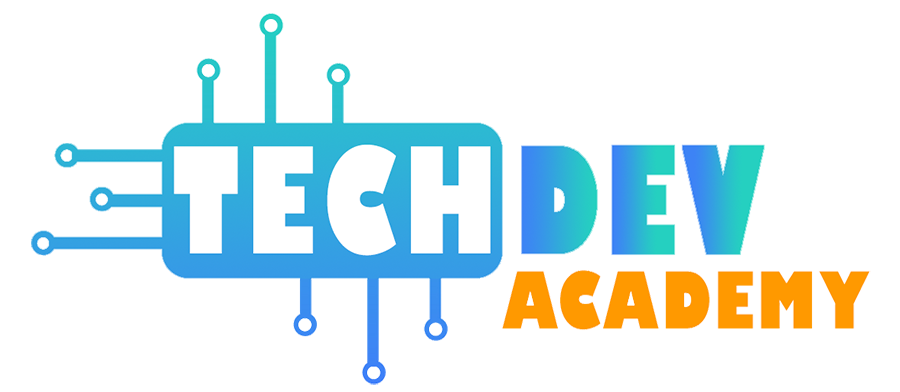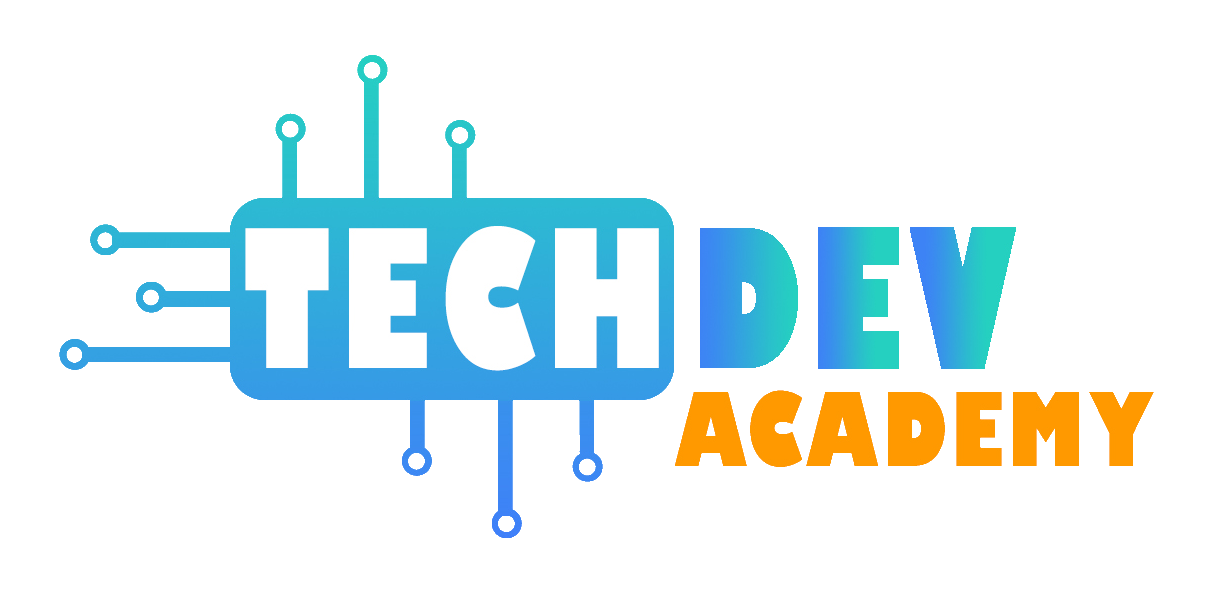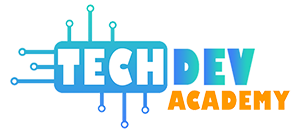- Intro. to Robotics (Age : 8-11)
- Robotics Design
- Coding Robotics (Intermediate)
- Design Thinking
- Startup Junior
Introduction to VEX Robotics
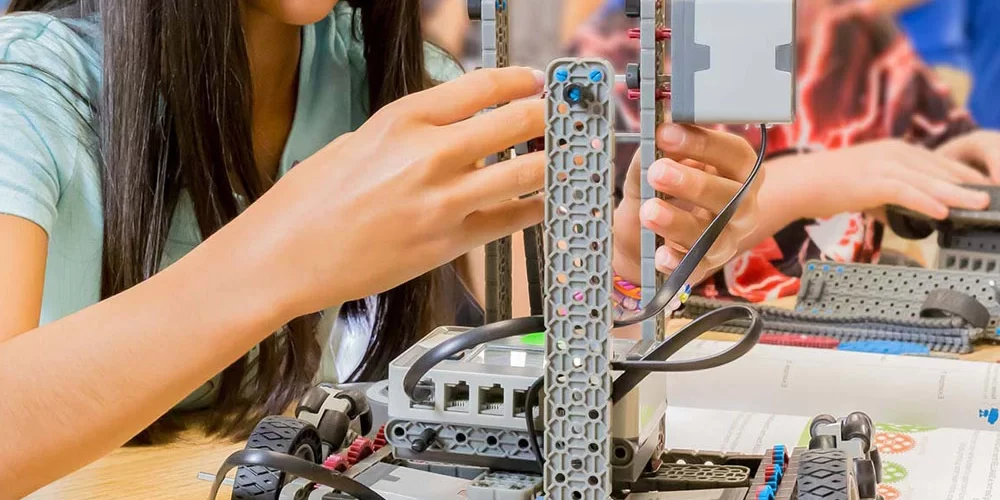




In this course, students will learn the basics of robotics and understand concepts. They will control and program robots with the graphical coding language of RobotC. Later, they will use sensors and develop projects with VEX robots. VEX Robotics Curriculum has been created by Carnie Mellon Robotics Academy to teach STEM. We are specifically using Virtual Robotics plus project-based VEX IQ hardware which is the VEX IQ Robotics starter kit for elementary students during our project time.
Here are some highlights of our robotics program:
Advance coding skills:
We teach RobotC programing language which is graphical programming with the capability of transitioning to text-based coding. We will primarily be using virtual robotics to implement our code.
Skill Building:
We teach STEM, leadership, collaboration, innovation, creativity, and problem-solving.
Transitions to competition-level robotics:
As students progress with follow-up courses, they may join and participate in nationwide competitions.
Future potential to acquire certification from Carnegie Mellon University:
As enthusiastic students progress with follow-up courses they may accomplish a higher level to be able to apply for a certificate from Carnegie Mellon with a $50 fee. Students will be able to build a college portfolio as they earn badges through VEX curriculum that continues through high school.
Projects in the summer camp:
Students will learn how robots work. Students will learn to control virtual and physical robots with codes. Students will perform simple projects where they will perform multiple independent tasks involving controlling sensors (color sensor, touch LED sensor, gyro sensor, distance sensor, bumper switch, and motor encoders). Students will become confident and competent in robotics.
Robotics Design





Campers will learn how to build robots. The curriculum will provide to improve their design thinking, problem-solving, and teamwork skills. We are teaching VEX Robotics Curriculum which has been created by Carnie Mellon Robotics Academy to teach STEM. We are specifically using Virtual Robotics plus project-based VEX IQ hardware which is the VEX IQ Robotics starter kit for elementary students during our project time.
Here are some highlights of our robotics program:
Design skills:
Using creative VEX robotics kits, students will improve their design thinking. Return campers will dive deep into more creative VEX robotics design.
Skill Building:
We teach STEM, leadership, collaboration, innovation, creativity, and problem-solving.
Transitions to competition-level robotics:
As students progress with follow-up courses, they may join and participate in nationwide competitions.
Students will be able to build a college portfolio as they earn badges through VEX curriculum that continues through high school.
Projects in the summer camp:
Students will learn how robots work. Students will learn to build virtual and physical robots. Students will perform simple projects where they will perform multiple independent tasks involving controlling sensors (color sensor, touch LED sensor, gyro sensor, distance sensor, bumper switch, and motor encoders). Students will become confident and competent in robotic after completing the robotics series.
Coding Robotics (intermediate)



Campers will learn intermediate coding skills with robotics. They will perform the advance task and gain new badges by utilizing robot sensors and learn engineering skills. This camp will help to transition to text-based coding to written coding. VEX Robotics Curriculum has been created by Carnie Mellon Robotics Academy to teach STEM. We are specifically using Virtual Robotics plus project-based VEX IQ hardware which is the VEX IQ Robotics starter kit for elementary students during our project time.
Here are some highlights of our robotics program:
Advance coding skills:
We teach RobotC programing language which is graphical programming with the capability of transitioning to text-based coding. We will primarily be using virtual robotics to implement our code.
Skill Building:
We teach STEM, leadership, collaboration, innovation, creativity and problem-solving.
Transitions to competition-level robotics:
As students progress with follow up courses, they may join and participate in nationwide competitions.
Future potential to acquire certification from Carnegie Mellon University:
As enthusiastic students progress with follow up courses they may accomplish a higher level to be able to apply for a certificate from Carnegie Mellon with a $50 fee.
Students will be able to build a college portfolio as they earn badges through VEX curriculum that continues through high school.
Projects in the summer camp:
Students will learn how robots work. Students will learn to control virtual and physical robots with codes. Students will perform simple projects where they will perform multiple independent tasks involving controlling sensors (color sensor, touch LED sensor, gyro sensor, distance sensor, bumper switch and motor encoders). Students will become confident and competent in robotics.
Design Thinking
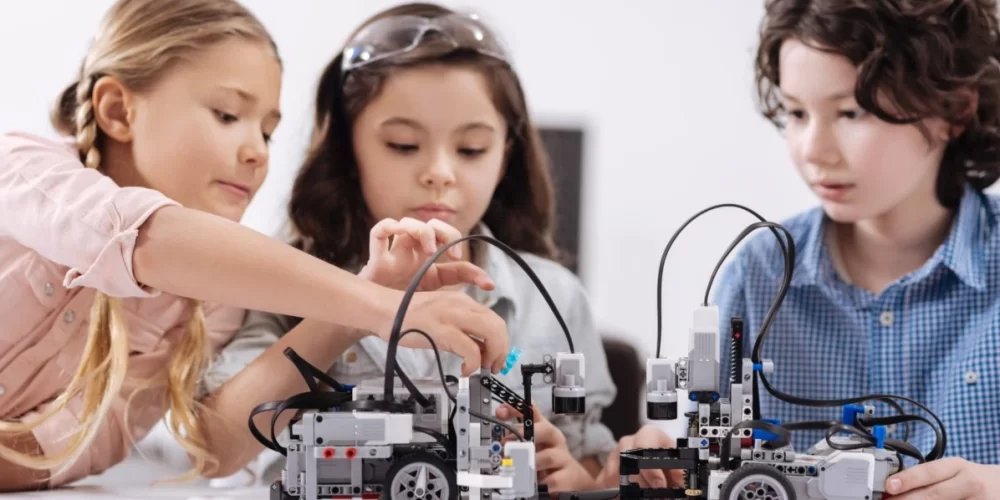


Techdev is bringing a new approach to summer camps with our design thinking summer camps. Students will explore their creativity and understand next-generation problems and needs in society. Our program is prepared by Stanford scientists and successful startups entrepreneurs.
Here are some highlights of our summer camps:
- Strong curriculum simplified for young entrepreneurs prepared by Stanford Scientist
- Fun, thinking, and creativity implemented in our daily curriculum.
- Students will document their experiences from their learning and discovery of design thinking.
- We teach stem, leadership, collaboration, innovation, and problem-solving.
Projects in the summer camp:
Bootcamp has multiple activities and projects that engage students in brainstorming, team building, project design, project planning, and implementation, team project presentations, peer reviews and critiquing, and team and self-evaluation.
Startup Junior
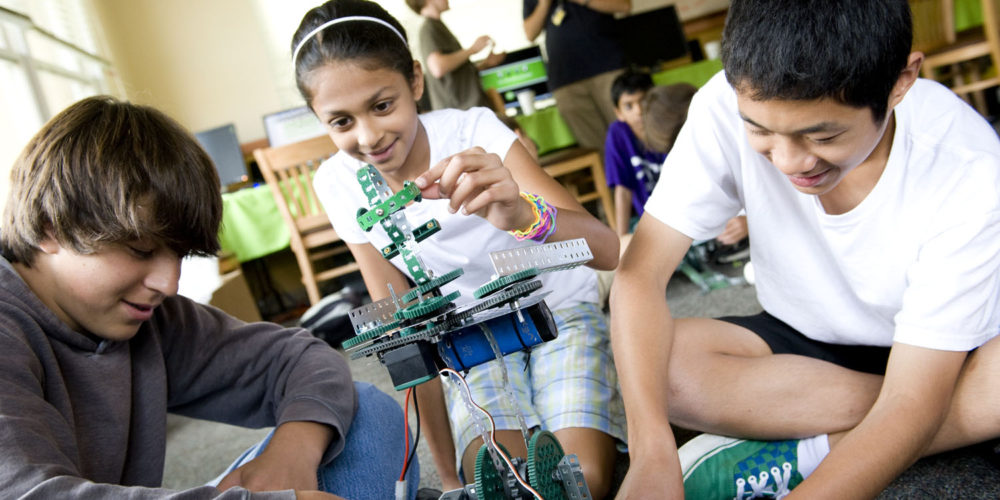


The best thing being at Silicon Valley is to be next to entrepreneurs. Techdev cofounders and mentors are successful startup entrepreneurs. We have designed a novel curriculum to give innovative and creative thinking skills. They will be able to learn what a startup can do and should do. They will team up and work on problems and they will build a startup and pitch ideas.
Here are some highlights of our summer camps:
- Strong curriculum simplified for young entrepreneurs prepared by Stanford Scientist
- Fun, thinking and creativity implemented in our daily curriculum.
- Students will build a startup and pitch their ideas.
- We teach stem, leadership, collaboration, innovation, and problem-solving.
Projects in the summer camp:
Bootcamp has multiple activities and projects that engage students in brainstorming, team building, project design, project planning, and implementation, team project presentations, peer reviews and critiquing, and team and self-evaluation.
Nextgen Kid (Robotics)
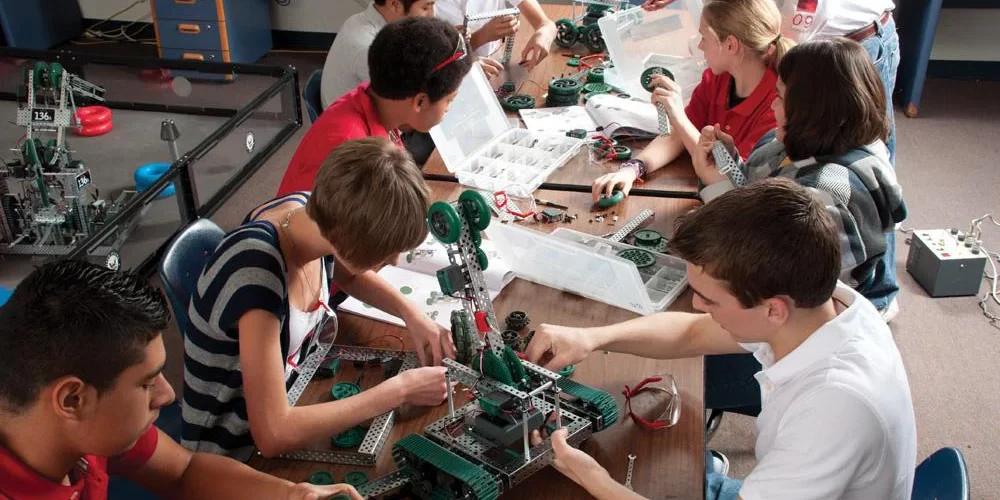


We designed three weeks of back-to-back Robotics camps for enthusiastic kids who would like to explore next-generation technologies and strengthen their robotics and coding skills. During those three weeks, they will start by designing different kinds of robots and understand the fundamentals. Later, they will learn how to code with graphical coding language and control robots embedded with sensors. In the third week, they will perform coding projects based on manipulating robots for specific tasks. At the end of the three weeks, they will make a transition to text-based coding.
Overall, the curriculum will provide to improve their design thinking, problem-solving, and teamwork skills. We are teaching VEX Robotics Curriculum which has been created by Carnie Mellon Robotics Academy to teach STEM. We are specifically using Virtual Robotics plus project-based VEX IQ hardware which is the VEX IQ Robotics starter kit for elementary students during our project time.
Here are some highlights of the robotics programs:
Design skills:
Using creative VEX robotics kits, students will improve their design thinking. Return campers will dive deep into more creative VEX robotics design.
Skill Building:
We teach STEM, leadership, collaboration, innovation, creativity and problem-solving.
Transitions to competition-level robotics:
As students progress with follow up courses, they may join and participate in nationwide competitions.
Students will be able to build a college portfolio as they earn badges through VEX curriculum that continues through high school.
Projects in the summer camp:
Students will learn how robots work. Students will learn to build virtual and physical robots. Students will perform simple projects where they will perform multiple independent tasks involving controlling sensors (color sensor, touch LED sensor, gyro sensor, distance sensor, bumper switch and motor encoders). Students will become confident and competent in robotic after completing the robotics series.
Young Entrepreneur (Age: 8-11)



“This camp is for campers who are between 8 and 11 years old.”
In this course, students will learn the basics of robotics and understand concepts. They will control and program robots with the graphical coding language of RobotC. Later, they will use sensors and develop projects with VEX robots. VEX Robotics Curriculum has been created by Carnie Mellon Robotics Academy to teach STEM. We are specifically using Virtual Robotics plus project-based VEX IQ hardware which is the VEX IQ Robotics starter kit for elementary students during our project time.
Here are some highlights of the robotics programs:
Advance coding skills:
We teach RobotC programing language which is graphical programming with the capability of transitioning to text-based coding. We will primarily be using virtual robotics to implement our code.
Skill Building:
We teach STEM, leadership, collaboration, innovation, creativity and problem-solving.
Transitions to competition-level robotics:
As students progress with follow up courses, they may join and participate in nationwide competitions.
Future potential to acquire certification from Carnegie Mellon University:
As enthusiastic students progress with follow up courses they may accomplish a higher level to be able to apply for a certificate from Carnegie Mellon with a $50 fee.
Students will be able to build a college portfolio as they earn badges through VEX curriculum that continues through high school.
Projects in the summer camp:
Students will learn how robots work. Students will learn to control virtual and physical robots with codes. Students will perform simple projects where they will perform multiple independent tasks involving controlling sensors (color sensor, touch LED sensor, gyro sensor, distance sensor, bumper switch and motor encoders). Students will become confident and competent in robotics.
- Intro. to Robotics (Age : 8-11)
- Robotics Design
- Coding Robotics (Intermediate)
- Design Thinking
- Startup Junior
Introduction to VEX Robotics





In this course, students will learn the basics of robotics and understand concepts. They will control and program robots with the graphical coding language of RobotC. Later, they will use sensors and develop projects with VEX robots. VEX Robotics Curriculum has been created by Carnie Mellon Robotics Academy to teach STEM. We are specifically using Virtual Robotics plus project-based VEX IQ hardware which is the VEX IQ Robotics starter kit for elementary students during our project time.
Here are some highlights of our robotics program:
Advance coding skills:
We teach RobotC programing language which is graphical programming with the capability of transitioning to text-based coding. We will primarily be using virtual robotics to implement our code.
Skill Building:
We teach STEM, leadership, collaboration, innovation, creativity, and problem-solving.
Transitions to competition-level robotics:
As students progress with follow-up courses, they may join and participate in nationwide competitions.
Future potential to acquire certification from Carnegie Mellon University:
As enthusiastic students progress with follow-up courses they may accomplish a higher level to be able to apply for a certificate from Carnegie Mellon with a $50 fee. Students will be able to build a college portfolio as they earn badges through VEX curriculum that continues through high school.
Projects in the summer camp:
Students will learn how robots work. Students will learn to control virtual and physical robots with codes. Students will perform simple projects where they will perform multiple independent tasks involving controlling sensors (color sensor, touch LED sensor, gyro sensor, distance sensor, bumper switch, and motor encoders). Students will become confident and competent in robotics.
Robotics Design





Campers will learn how to build robots. The curriculum will provide to improve their design thinking, problem-solving, and teamwork skills. We are teaching VEX Robotics Curriculum which has been created by Carnie Mellon Robotics Academy to teach STEM. We are specifically using Virtual Robotics plus project-based VEX IQ hardware which is the VEX IQ Robotics starter kit for elementary students during our project time.
Here are some highlights of our robotics program:
Design skills:
Using creative VEX robotics kits, students will improve their design thinking. Return campers will dive deep into more creative VEX robotics design.
Skill Building:
We teach STEM, leadership, collaboration, innovation, creativity, and problem-solving.
Transitions to competition-level robotics:
As students progress with follow-up courses, they may join and participate in nationwide competitions.
Students will be able to build a college portfolio as they earn badges through VEX curriculum that continues through high school.
Projects in the summer camp:
Students will learn how robots work. Students will learn to build virtual and physical robots. Students will perform simple projects where they will perform multiple independent tasks involving controlling sensors (color sensor, touch LED sensor, gyro sensor, distance sensor, bumper switch, and motor encoders). Students will become confident and competent in robotic after completing the robotics series.
Coding Robotics (intermediate)



Campers will learn intermediate coding skills with robotics. They will perform the advance task and gain new badges by utilizing robot sensors and learn engineering skills. This camp will help to transition to text-based coding to written coding. VEX Robotics Curriculum has been created by Carnie Mellon Robotics Academy to teach STEM. We are specifically using Virtual Robotics plus project-based VEX IQ hardware which is the VEX IQ Robotics starter kit for elementary students during our project time.
Here are some highlights of our robotics program:
Advance coding skills:
We teach RobotC programing language which is graphical programming with the capability of transitioning to text-based coding. We will primarily be using virtual robotics to implement our code.
Skill Building:
We teach STEM, leadership, collaboration, innovation, creativity and problem-solving.
Transitions to competition-level robotics:
As students progress with follow up courses, they may join and participate in nationwide competitions.
Future potential to acquire certification from Carnegie Mellon University:
As enthusiastic students progress with follow up courses they may accomplish a higher level to be able to apply for a certificate from Carnegie Mellon with a $50 fee.
Students will be able to build a college portfolio as they earn badges through VEX curriculum that continues through high school.
Projects in the summer camp:
Students will learn how robots work. Students will learn to control virtual and physical robots with codes. Students will perform simple projects where they will perform multiple independent tasks involving controlling sensors (color sensor, touch LED sensor, gyro sensor, distance sensor, bumper switch and motor encoders). Students will become confident and competent in robotics.
Design Thinking



Techdev is bringing a new approach to summer camps with our design thinking summer camps. Students will explore their creativity and understand next-generation problems and needs in society. Our program is prepared by Stanford scientists and successful startups entrepreneurs.
Here are some highlights of our summer camps:
- Strong curriculum simplified for young entrepreneurs prepared by Stanford Scientist
- Fun, thinking, and creativity implemented in our daily curriculum.
- Students will document their experiences from their learning and discovery of design thinking.
- We teach stem, leadership, collaboration, innovation, and problem-solving.
Projects in the summer camp:
Bootcamp has multiple activities and projects that engage students in brainstorming, team building, project design, project planning, and implementation, team project presentations, peer reviews and critiquing, and team and self-evaluation.
Startup Junior



The best thing being at Silicon Valley is to be next to entrepreneurs. Techdev cofounders and mentors are successful startup entrepreneurs. We have designed a novel curriculum to give innovative and creative thinking skills. They will be able to learn what a startup can do and should do. They will team up and work on problems and they will build a startup and pitch ideas.
Here are some highlights of our summer camps:
- Strong curriculum simplified for young entrepreneurs prepared by Stanford Scientist
- Fun, thinking and creativity implemented in our daily curriculum.
- Students will build a startup and pitch their ideas.
- We teach stem, leadership, collaboration, innovation, and problem-solving.
Projects in the summer camp:
Bootcamp has multiple activities and projects that engage students in brainstorming, team building, project design, project planning, and implementation, team project presentations, peer reviews and critiquing, and team and self-evaluation.
Nextgen Kid (Robotics)



We designed three weeks of back-to-back Robotics camps for enthusiastic kids who would like to explore next-generation technologies and strengthen their robotics and coding skills. During those three weeks, they will start by designing different kinds of robots and understand the fundamentals. Later, they will learn how to code with graphical coding language and control robots embedded with sensors. In the third week, they will perform coding projects based on manipulating robots for specific tasks. At the end of the three weeks, they will make a transition to text-based coding.
Overall, the curriculum will provide to improve their design thinking, problem-solving, and teamwork skills. We are teaching VEX Robotics Curriculum which has been created by Carnie Mellon Robotics Academy to teach STEM. We are specifically using Virtual Robotics plus project-based VEX IQ hardware which is the VEX IQ Robotics starter kit for elementary students during our project time.
Here are some highlights of the robotics programs:
Design skills:
Using creative VEX robotics kits, students will improve their design thinking. Return campers will dive deep into more creative VEX robotics design.
Skill Building:
We teach STEM, leadership, collaboration, innovation, creativity and problem-solving.
Transitions to competition-level robotics:
As students progress with follow up courses, they may join and participate in nationwide competitions.
Students will be able to build a college portfolio as they earn badges through VEX curriculum that continues through high school.
Projects in the summer camp:
Students will learn how robots work. Students will learn to build virtual and physical robots. Students will perform simple projects where they will perform multiple independent tasks involving controlling sensors (color sensor, touch LED sensor, gyro sensor, distance sensor, bumper switch and motor encoders). Students will become confident and competent in robotic after completing the robotics series.
Young Entrepreneur (Age: 8-11)



“This camp is for campers who are between 8 and 11 years old.”
In this course, students will learn the basics of robotics and understand concepts. They will control and program robots with the graphical coding language of RobotC. Later, they will use sensors and develop projects with VEX robots. VEX Robotics Curriculum has been created by Carnie Mellon Robotics Academy to teach STEM. We are specifically using Virtual Robotics plus project-based VEX IQ hardware which is the VEX IQ Robotics starter kit for elementary students during our project time.
Here are some highlights of the robotics programs:
Advance coding skills:
We teach RobotC programing language which is graphical programming with the capability of transitioning to text-based coding. We will primarily be using virtual robotics to implement our code.
Skill Building:
We teach STEM, leadership, collaboration, innovation, creativity and problem-solving.
Transitions to competition-level robotics:
As students progress with follow up courses, they may join and participate in nationwide competitions.
Future potential to acquire certification from Carnegie Mellon University:
As enthusiastic students progress with follow up courses they may accomplish a higher level to be able to apply for a certificate from Carnegie Mellon with a $50 fee.
Students will be able to build a college portfolio as they earn badges through VEX curriculum that continues through high school.
Projects in the summer camp:
Students will learn how robots work. Students will learn to control virtual and physical robots with codes. Students will perform simple projects where they will perform multiple independent tasks involving controlling sensors (color sensor, touch LED sensor, gyro sensor, distance sensor, bumper switch and motor encoders). Students will become confident and competent in robotics.
